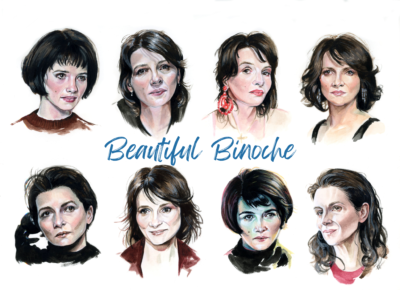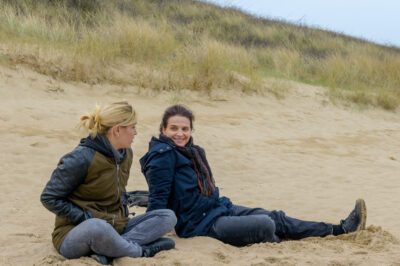A longtime passion project for star and Academy Award-winning Actress Juliette Binoche, the new film Between Two Worlds is adapted from Florence Aubenas’s bestselling nonfiction work Le Quai de Ouistreham (The Night Cleaner), and marks Emmanuel Carrère’s return to directing for the first time since The Moustache in 2008. Carrère has achieved world renown and acclaim as an author and has been described by Karl Ove Knausgaard as “the most exciting living writer.”
Binoche plays famed author Marianne Winckler as she goes undercover to investigate the exploitation of the working class in Northern France. She eventually lands a job as a cleaner on the cross-channel ferry and develops close connections with the other cleaning women, many of whom have extremely limited resources and income opportunities. As she learns more about the plight of these workers, Marianne struggles with her deception of them and tries to rationalize that it’s for the greater good.
Between Two Worlds had its world premiere as part of the Director’s Fortnight section at the Cannes Film Festival and earned Binoche César and Lumière Best Actress nominations and newcomer Hélène Lambert a Most Promising Actress Lumière nomination. We open the film August 11 at the Royal and and August 18 at the Town Center.
Stay tuned to our socials for a chance to win a limited edition Binoche mini-poster, seen here:

Binoche was interviewed about the film:
Q: When did you first read Florence Aubenas’s “The Night Cleaner?”
A: Probably in 2010 when it was published. It was Cédric Kahn who recommended that I read it, with the idea of making it into a film. I was obviously enthusiastic. But shortly thereafter, Cédric told me to forget about it. Florence Aubenas did not want to give up the adaptation rights, which she confirmed to me when I asked her directly. For her, it was a thing of the past, and she didn’t want to revisit it in a movie.
I’m quite stubborn when a project is close to my heart. So I asked Florence again, and she told me that the only way she would accept was on the condition that Emmanuel Carrère write the screenplay. But Emmanuel was not available at the time; he was working on his novel, “The Kingdom.” To sweeten the deal, I suggested that Emmanuel not only write the adaptation but direct the film. After several dinners with Emmanuel and Florence, she finally agreed. I met a producer who, by chance, was also working on an adaptation of “The Night Cleaner.” The project was starting to take shape but I didn’t want just to act in the film, I wanted to produce it, which for various reasons was refused to me. I experienced this rejection as unfair and humiliating. That being said, since the central theme of Between Two Worlds is the humiliation of women, in the end, it served me well.

Q: When your name is Juliette Binoche, a well-known and recognized actress, how do you get women who are non-professional actresses (and who play their own role as housekeepers) to accept you?
A: My father was dying. I arrived on the set broken and exhausted, which meant that immediately, I was in physical and mental tune with what I had to experience in the film. And the women who played alongside me in the film sensed it right away. I’ve always wanted to play a housekeeper, and basically step into a different universe. When my Polish grandmother came to France during World War II, she had to do odd jobs, like house cleaning, in order to survive. When my mother was a student, she also did some housekeeping jobs. And I too, as a student, did various odd jobs. So in a way, it’s been part of my family history for a long time and it’s still part of me – it’s all about being resourceful and getting by.

Q: Did you do specific research on these women who slave away on ferries?
A: When preparing to shoot Leos Carax’s The Lovers on the Bridge, I spent some time incognito on the street and at the night shelter in Nanterre, which welcomed homeless people in distress. At the end of one of those nights, I returned by bus to Paris with a gentleman of Indian origin who had no idea I was an actress on a scouting mission. He took out a 500-franc note from his pocket and said to me, “If you want, we can spend it together.“ I was extremely touched, but that did not challenge my desire and my right to play the part of a girl who lives on the streets.
The same goes for my role in Between Two Worlds. There is no guilt to be had; the goal here is to understand the life of these quasi-domestic slaves and, if possible, to change the awareness of their miserable living conditions. It’s exactly what happened with Florence’s book, which luckily was a great success, and which I think… I hope… has changed the condition of housekeepers. And made the invisible visible.
Q: Did you read the book again before filming?
A: Yes, of course, but above all the screenplay by Emmanuel Carrère and Hélène Devynck, which is a variation of the book, rather than a literal adaptation. The script stood by itself, like a new fruit grown on the tree that Florence had planted, with its stone, its flesh, its skin… While the film owes everything to the book, it has also grafted its own uniqueness to it.
Q: Most of the other parts in the film are not played by professional actresses but by women reenacting their daily lives…
A: I spent a lot of time talking with these women. Especially with Hélène Lambert, who undoubtedly had the most uncertain temperament in the group. She was building a very strong wall around herself, before deciding if she was going to like playing this role (which was not really a role) and especially, before deciding if she was going to accept me. It took the necessary time, and then suddenly, between two takes, she opened up, telling me about her life as a single mother raising three young children, her various hardships, her walks of several kilometers in the early morning to reach her work place, her family relations…Before taking on the part, my role was to talk to these women, reassure them and convince them that they were quite capable of taking on the happy responsibility of showing the hidden world of their professions, a bit like teaching someone to dance. They are all fantastic: Hélène Lambert, Léa Carne, Emily Madeleine, Evelyne Porée, etc.
Q: What did you learn from them?
A: I was there for them, and they were there for me. I know what work is like, but I hadn’t imagined what it feels like to work and earn so little –virtually nothing– with your hands in shit, literally. Same for the kilometers to cover each morning at dawn, or late in the evening, when most people are in the comfort of their homes. Above all, these women taught me that even in the depths of misery, there is a need for friendship, for fooling around, and having fun. We laughed a lot together.
Q: In this film that revolves around women, there are a few men, including a very endearing character, who is quite flirtatious…
A: It’s Didier Pupin, and he plays this role with great warmth. At the time, he worked at Saint-Maclou [a chain of French stores specializing in floors, walls and windows.] He explained to me how to install carpet! There are also the two Black workers, who are beautiful, and not just physically. On the ferry, or during the break, they just gave in to the joy of living, of laughing and sometimes singing, despite everything.
Q: Between Two Worlds is also a story of betrayal and lies… [WARNING: SPOILER AHEAD]
A: This is a fundamental aspect of the film. My character, Marianne, is no longer a journalist, as in Florence Aubenas’s book, but a well-known writer who decides to experience misery in her little corner and tries to remain unnoticed. Obviously, there’s something in her that reminds us of a spy, or rather, a detective, but in the specific way an actress researches a character so that she can reach that crucial moment when feelings come true.
Marianne is in the middle of the others, she’s with them, with sincerity, but she’s also at a distance, since she takes notes in a notebook and transcribes them at night on her laptop. Where is the boundary between truth and lies? How far are we allowed to lie for the truth to be captured? During the scene where Christèle unmasks Marianne, how do you capture this mixture of stupefaction and disappointment?
Q: Whether or not they’ve read Florence Aubenas’s book, some audience members may be disappointed in the film – you know how it goes: “that’s not how I imagined it…”
A: It’s bound to happen, and they are free to think that way, but it would be good if those who are disappointed reflected on the nature of their disappointment. One of the film’s strengths is precisely that it’s not what people might expect it to be: a precise visual representation of the book, word for word. The film doesn’t petrify the universe of the book; quite the opposite: it extends it and takes it in new directions. I’m really happy and proud that I contributed to this amplification.
Interview conducted by Gérard Lefort
